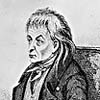
| Iolo Morganwg
Iolo Morganwg was the bardic name of Edward Williams (Llancarfan, Glamorgan, Wales 1747-1826), an influential antiquarian, poet, collector and literary forger. The name is Welsh for "Ned of Glamorgan".
Edward Williams spent his working life as a stonemason. It is as Iolo Morganwg that he is remembered, chiefly for his role in (re)creating modern bardic ritual and philosophy. His bardic teacher was Siôn Bradford of Tir Iarll. Iolo first came to public notice by revealing some previously undiscovered poetry by Dafydd ap Gwilym, generally considered to be the greatest Welsh poet, in 1789. These poems were in fact forgeries, but survived critical attention for over hundred years. His success lead Iolo to move to London. Become a significant figure in the Welsh community there he held the first Gorsedd, Gorsedd Beirdd Ynys Prydain, at a ceremony in 1792 at Primrose Hill, London. He went on to author fairly substantial works (most of which are now considered forgeries) claiming that the ancient druidic tradition had survived intact in Wales, despite the Roman conquest, Christianity, the persecution of the bards under King Edward I, and other adversities.
Iolo's philosophy represented a fusion of Christian and Arthurian influences, a proto-romanticism comparable to that of William Blake and the Scottish poet and forger James MacPherson, the revived antiquarian enthusiasm for all things "Celtic", and such elements of bardic heritage as had genuinely survived among Welsh-language poets. Part of his aim was to assert the Welshness of the South, particularly his home region of Glamorgan, against the prevalent idea that North Wales represented the purest survival of Welsh traditions.
Like many Romantic poets he was addicted to laudanum for most of his life, which may have affected his mental condition.
Iolo was the author of the "Druid's Prayer" or "Gorsedd prayer" (Gweddi'r Derwydd or Gweddi'r Orsedd in Welsh), which is still a staple of the ritual of both gorseddau and Neo-Druidism. His metaphysics outlined a theory of concentric 'rings of existence', proceeding outward from Annwn (the Otherworld) through Abred and Ceugant to Gwynfyd (purity or Heaven).
Among his writings was Cyfrinach Beirdd Ynys Prydain, or "The Mystery of the Bards of the Isle of Britain" (1829), a treatise on Welsh metrics. He also forged an extra set of Welsh Triads.
A Welsh language school in Cowbridge, Ysgol Iolo Morgannwg, is named after him. |






